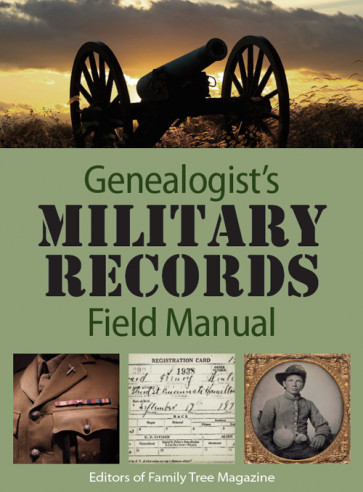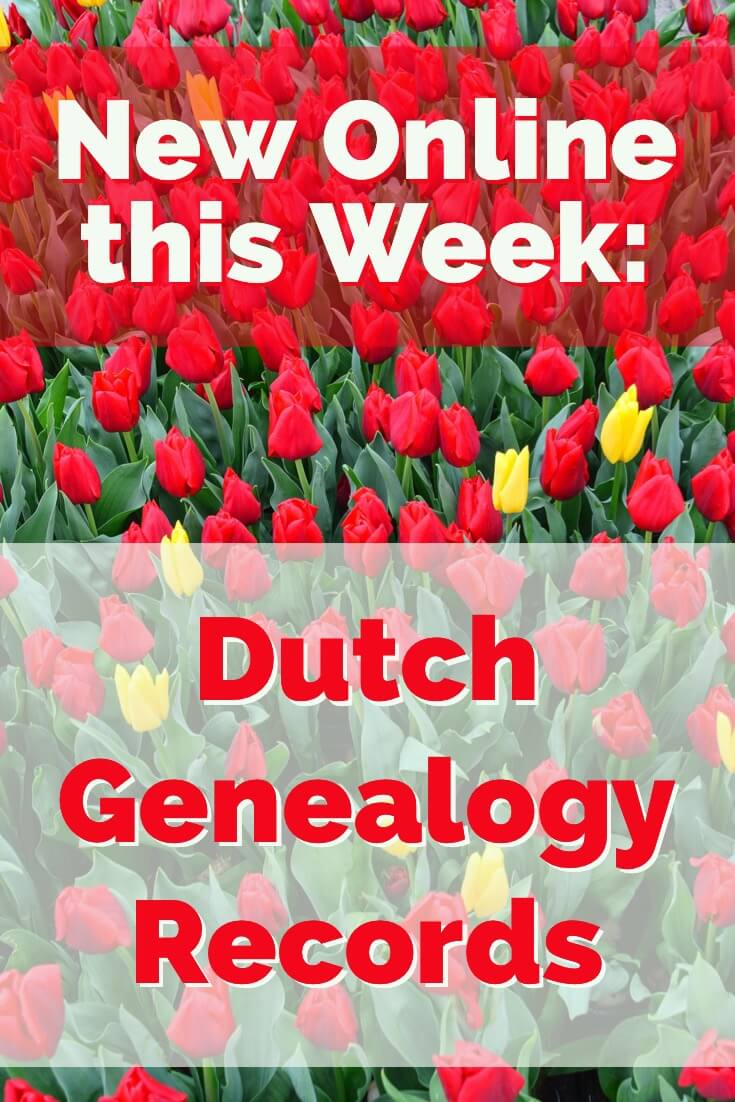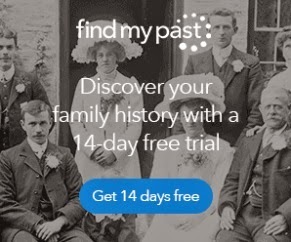by Lisa Cooke | Apr 15, 2019 | 01 What's New, FamilySearch, Records & databases |
Browse-only databases at FamilySearch are easy to use and may hold the key to the genealogy brick wall you have been working on.
Don’t be scared off because the records haven’t been indexed. Guest blogger Amie Tennant Bowser show you how to take advantage of these great records!

New Genealogy Records Come Online Every Week
Each week, we report on the latest genealogy records to have come online.
Sometimes in our weekly record update articles we include databases from the free FamilySearch website that are not yet indexed. These collections are referred to as browse-only. Have you ever been disappointed when you realized the database you are most interested in is only able to be browsed?
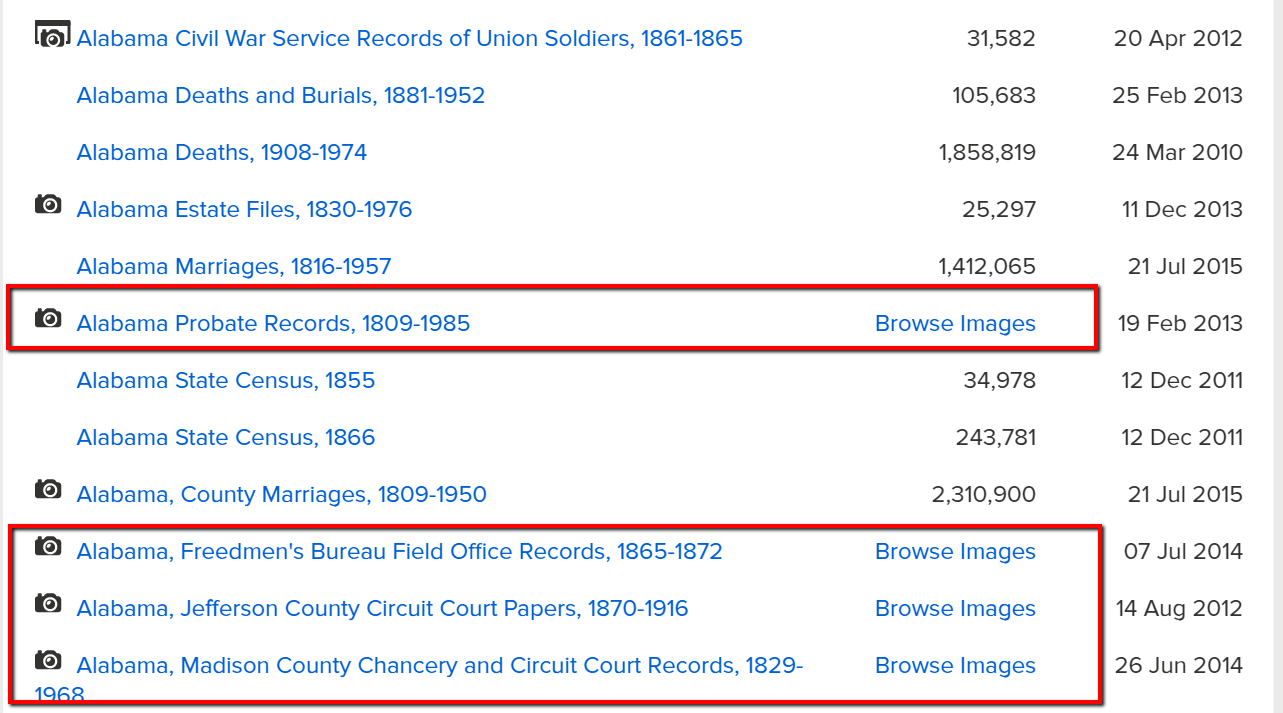
The highlighted genealogy records in these collections are browse-only
You may be thinking, “Good grief! I can’t possibly browse thousands of records!” and we don’t expect you to. In this article we are going to share strategies that you can use to zero in on the genealogy records you want to browse.
Browse Only Records Versus Indexed Records
Most folks search for genealogy records at FamilySearch by typing in some key information at the home page. It might be just the first and last name, and the place where that ancestor lived. Here’s an example:
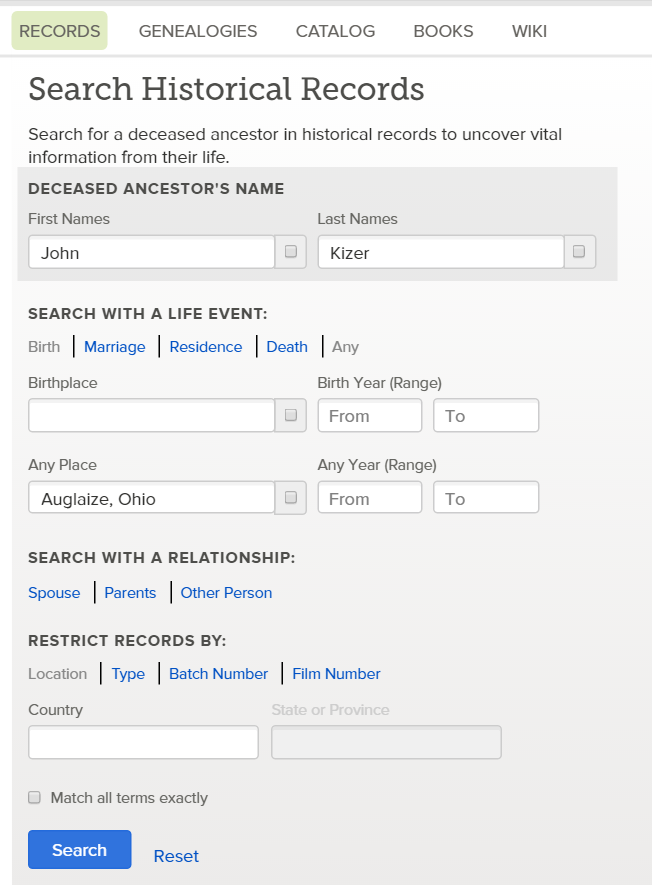
When you use this method, you are only searching for records that have been indexed.
Indexed records are great because they have already been reviewed by one of the thousands of FamilySearch volunteers. They use online software on the FamilySearch website to download images of historical documents. Then, they read the information on the image and transcribe the information.
A second, more experienced volunteer then reviews the transcribed information to ensure accuracy before it is submitted to the website where they can be searched. It’s a huge effort to help genealogists more easily search the online records.
So, it’s important to understand that not all digitized record images that are on the FamilySearch website have been indexed. This means there may be countless records that will not be retrieved by a name search.
Unindexed records can only be browsed until they are indexed. So as you can see, there is a very good chance that there are records on the site that apply to your family, but you won’t find them through the search engine.
Instead, you need to go in the virtual “back door” to locate these records. Follow along with me and I’ll show you how.
How to Find Browse-Only Records at FamilySearch
Let’s imagine you want to search probate records in Auglaize County, Ohio.
You would click the little map in the vicinity of the United States and choose “Ohio” from the pop-up box.
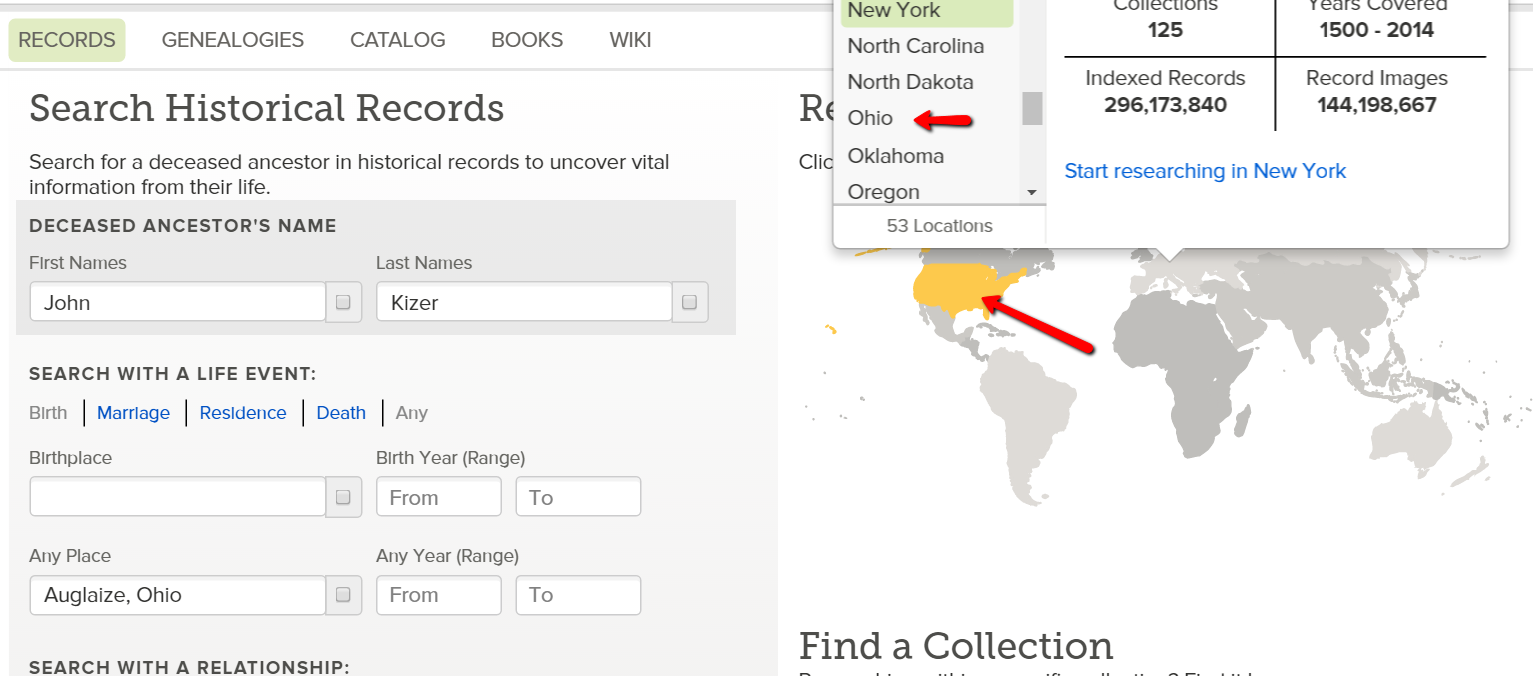
At the Ohio research page, you could do a general search of the Ohio collections. Again, this is only searching records that have been indexed.
Instead of using this method, scroll down until you see “Ohio Image Only Historical Records.” Look at all these databases you might have missed!
For our example, continue to scroll down until you see the database titled “Ohio Probate Records, 1789-1996” near the bottom. Click on it.
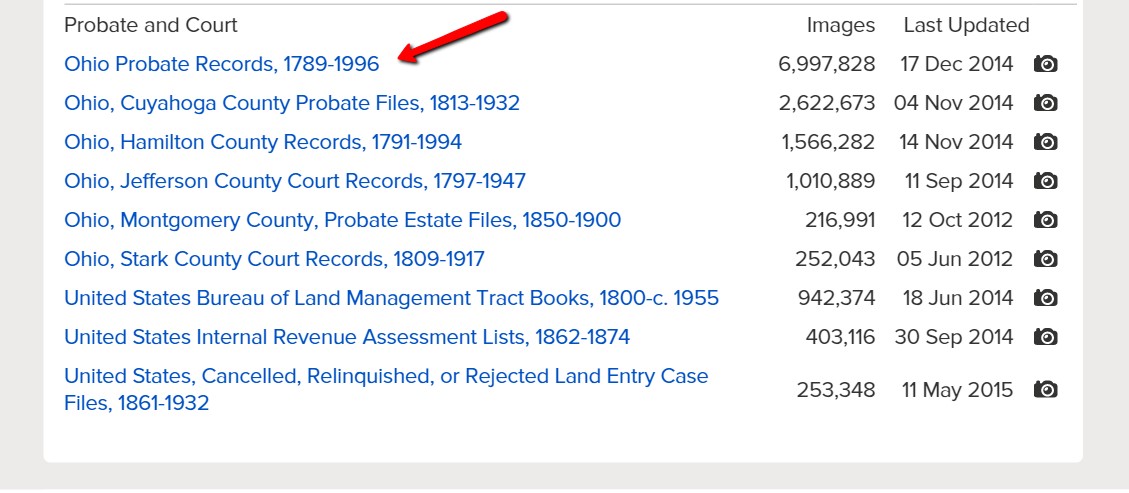
You will notice right away that there is no way to “search” this database.
Many people give up at this point, after all, who has time to search nearly 7,000,000 records. Click on it anyway!
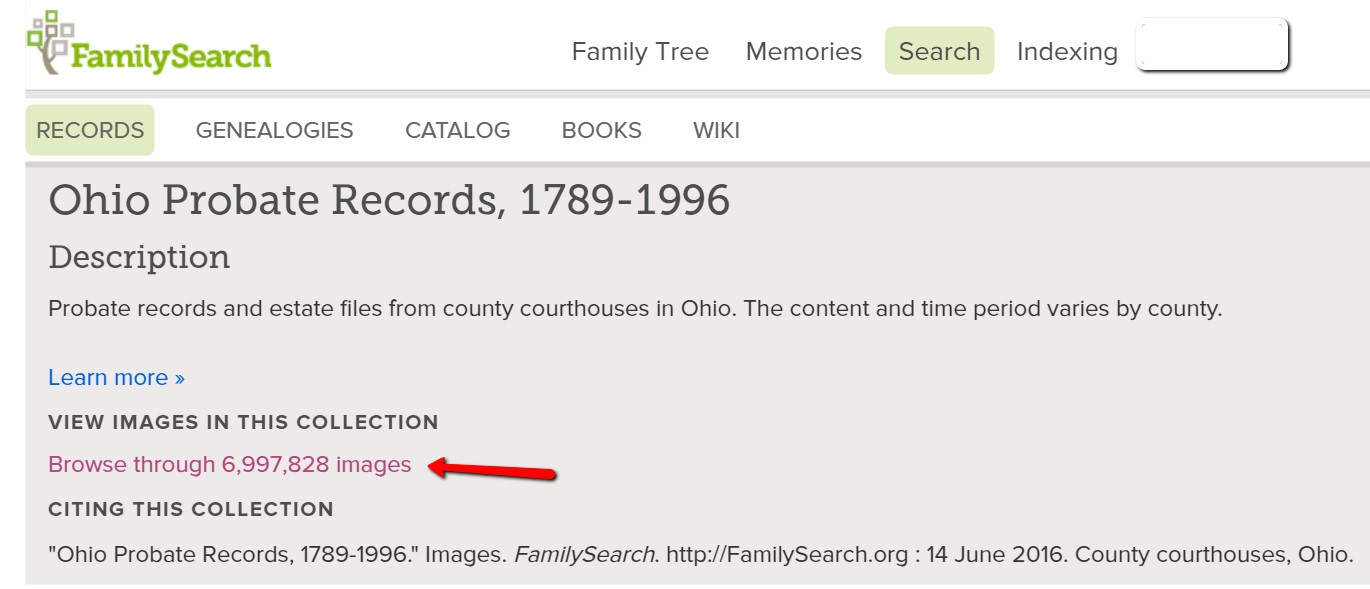
The next screen has been broken down by county name. Choose the desired county name. In this case, I’m selecting “Auglaize.”
You are then directed to a page listing the volumes of records for Auglaize county that have been digitized.
In this example, we are seeing bonds, settlements, wills, estates, and so much more:
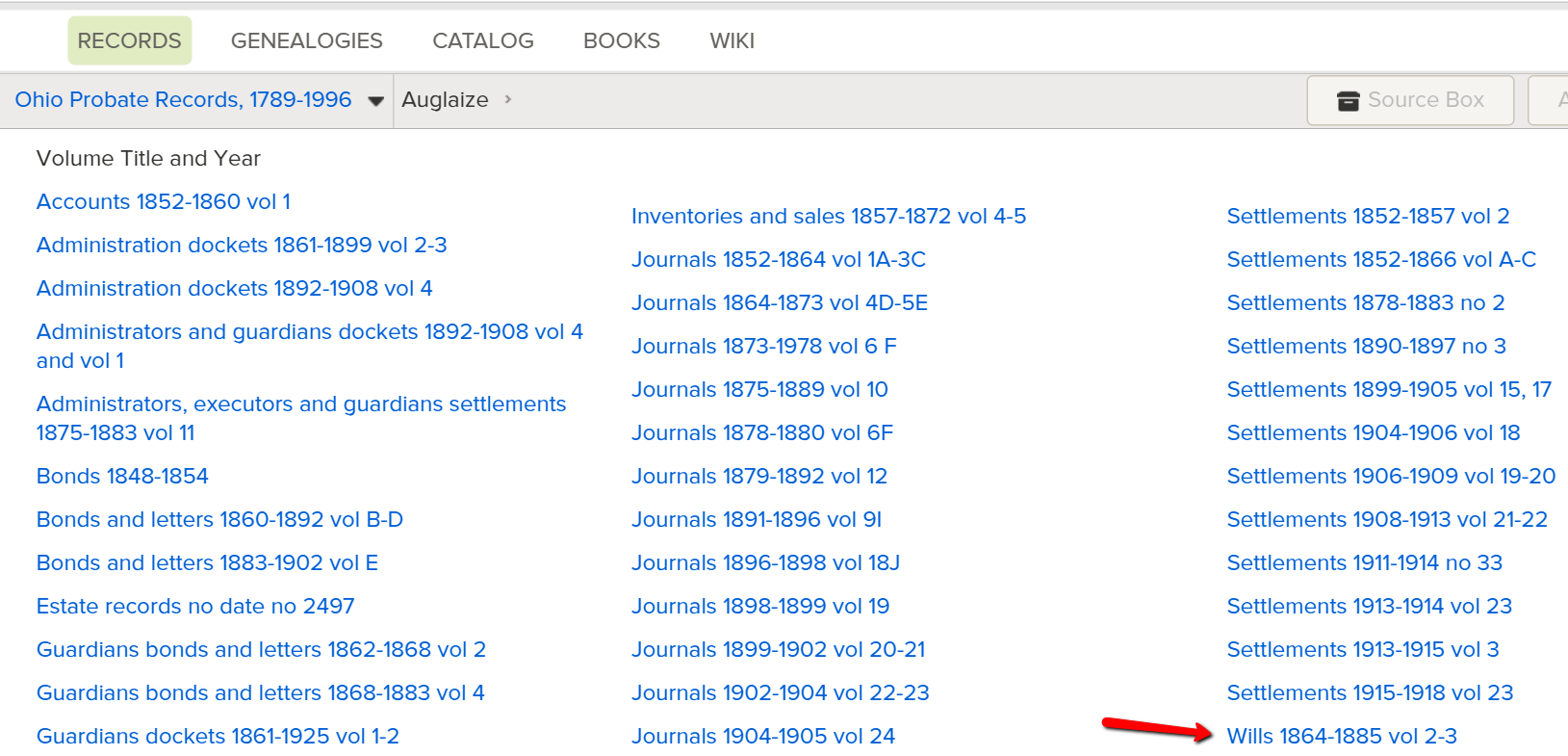
It is as if you are standing in the courthouse probate office surrounded by volumes and volumes of the records you need.
Select the volume you want to search by clicking the title.
“Open” the pages of the book and search like you would as if you were flipping the pages of a book or scrolling through a roll of microfilm.
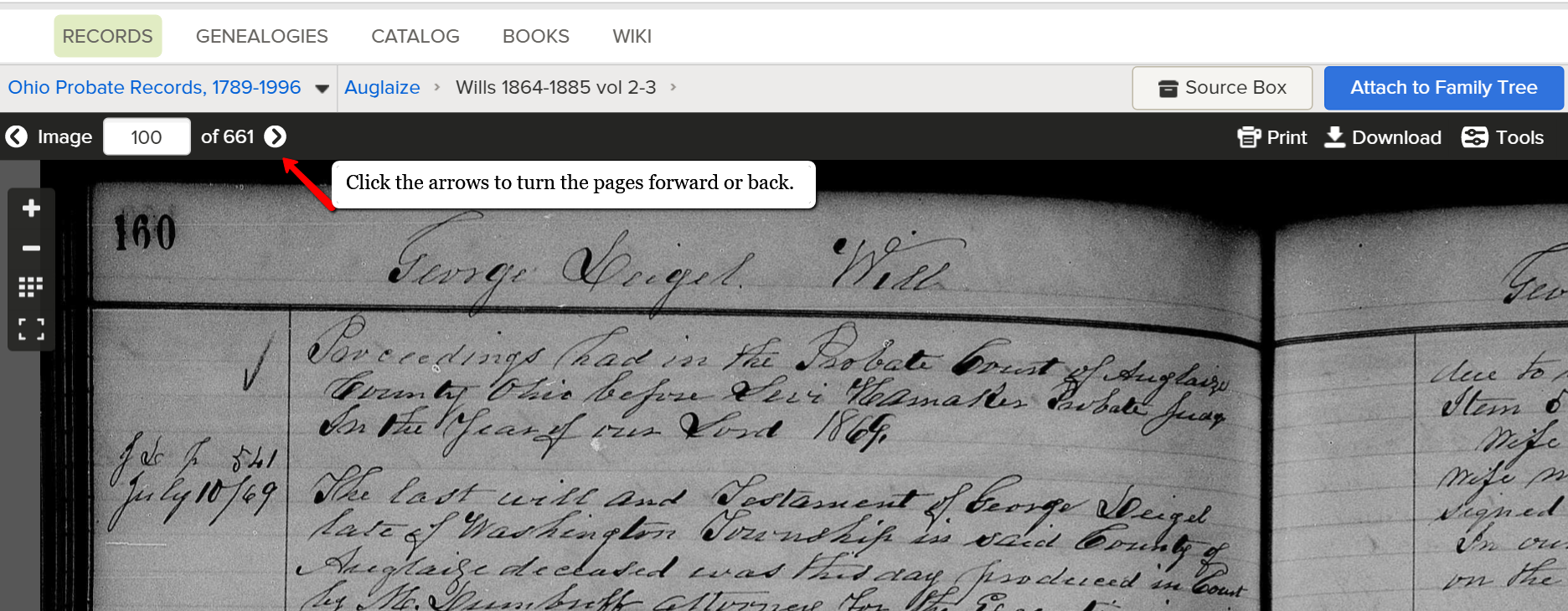
Click the arrow at the top of the screen to scroll through the pages.
Friends, we want you to get excited about all the new records that are coming online, even if they are browse only databases. If you like this tutorial, share this tip with your genie friends so they can do it too.
More Genealogy Gems on Records and Databases at FamilySearch
For more tips and tricks to help you in your genealogy journey, sign-up for our newsletter by entering your email address on this page.
If you’re looking for more genealogy records to mine, here are some of our articles. These will help you not only find new records, but also use other valuable genealogy indexes:
by Lacey Cooke | Mar 22, 2019 | 01 What's New, Norwegian, Records & databases |
Genealogy Giants MyHeritage and Ancestry have both added 3 Norway Census collections to their databases, totaling millions of new records. If you have Norwegian origins, these census documents contain valuable details about your ancestors that have been largely unavailable online until now. Then head over to FamilySearch for a massive German records collection now available for free on their website.
Norway Census Records
Both MyHeritage.com and Ancestry.com have recently released millions of new records from nationwide censuses conducted in Norway more than a century ago. It’s a treasure trove of information for anyone with Norwegian heritage.
MyHeritage provided a press release that has great information about these Norwegian records:
“The collections provide robust coverage for Norway’s entire population during a span of two decades and include valuable family history information. While some former Norway censuses were conducted only in select trading centers, these records are more comprehensive. The 6.5 million new records document names, households, dates of birth, marital status, relationships, and residential conditions, making them vital for anyone wishing to explore their Norwegian origins. Their publication marks the first time that Norwegian record collections of such high quality and granularity are available online.
The 1891 and 1900 collections include digital images of the original census documents, while the 1910 collection is an index consisting of transcribed records provided by the National Archives of Norway. The 1900 census was conducted by means that were, at the time, innovative: punch cards, which were then sorted and counted using electric tabulating machines. Of the 2.3 million records in the 1900 collection, 1.9 million records now have digital images of the original documents associated with the census index. Images of the remaining records will likewise be connected to the index in the near future.
Norwegian privacy laws restrict public access to census data for 100 years. Consequently, the 1910 census is the most recent one available to the public. This collection stands out as the first census conducted following the dissolution of Norway’s union with Sweden in 1905. It is also the first Norway census to record full birth dates, rather than only birth years.”
German Records Online at FamilySearch
The all-free genealogy records site FamilySearch.org has added a huge records collection this week as well for Germany. The Bavaria, Middle Franconia, Brenner Collection of Genealogical Records, 1550-1900 includes over 2.5 million records. This alphabetical collection of family group sheets was compiled from records from 97 parishes in the area and was originally created by Tobias Brenner and others between 1918 and 1945. The records are written in pencil on pre-printed forms in Gothic German handwriting.
Watch Finding German Villages
with James M. Beidler
Learn more about the Genealogy Giants
“Which genealogy records membership website should I use?” It’s one of the most-asked questions in genealogy—and this quick reference guide answers it! The Genealogy Giants guide is the perfect tool to quickly and easily compare all of the most important features of the four biggest international genealogy records membership websites: Ancestry.com, FamilySearch.org, Findmypast.com and MyHeritage.com. Then consult it every time your research budget, needs or goals change. Tables, bulleted lists and graphics make this guide as easy to use as it is informative. Available in both print and digital download.
Lacey has been working with Genealogy Gems since the company’s inception in 2007. Now, as the full-time manager of Genealogy Gems, she creates the free weekly newsletter, writes blogs, coordinates live events, and collaborates on new product development. No stranger to working with dead people, Lacey holds a degree in Forensic Anthropology, and is passionate about criminal justice and investigative techniques. She is the proud dog mom of Renly the corgi.
Disclosure: This article contains affiliate links and Genealogy Gems will be compensated if you make a purchase after clicking on these links (at no additional cost to you). Thank you for supporting Genealogy Gems!
by Lacey Cooke | Dec 14, 2018 | 01 What's New, Records & databases
Featured this week is a fantastic resource for anyone searching for Dutch ancestors! Open Archives recently celebrated reaching 200 million historical person entries and collaborates with dozens of libraries and genealogical societies to make them all available online in one place. Also featured this week is the Ireland 1911 Census, online access to the New York Death Index, and major new additions to records for Hampshire, England.
Featured: Dutch Records at OpenArchives
Recently, we received an email from a Genealogy Gems Podcast listener about a huge milestone achieved by the Open Archives website. This free site is home to the largest collection of references to persons in Dutch historical records, and they just reached 200 million historical person entries! If you are researching your ancestors in the Netherlands, this is a one-stop-shop to access the records you need, since Open Archives currently offers data from 86 organizations.
From the press release: “…dive into records of the civil registry, baptism, marriage and burial registers, notarial deeds, militia registers and personnel administrations. Prayer cards, family messages and funeral cards are also very useful for genealogical research. Archive institutions and also local history and genealogical societies manage these sources, which are increasingly being made available in digital form. Open Archives has made the person entries in these sources searchable in one place.”
Ireland 1911 Census
Following the recent addition of the 1901 Census, FamilySearch has now made available the Ireland 1911 Census. This new collection is comprised of over 4 million indexed records. Search for your Irish ancestors and this collection might reveal their name, age, occupation, relationship to the head of household, marital status, education/literacy, religion, birth country, and other information. The index is free on FamilySearch and was created by the National Archives of Ireland.
New York Death Index
At MyHeritage, you can now browse 4.7 million records in the New York State Death Index, 1880-1956. You’ll find information on place and date of death, gender, age at death and the State file number. The images in this collection have been obtained through the outstanding work and efforts of Reclaim the Records. Due to the poor original documents these images are low-quality. For deaths referenced in this index copies of original death certificates can be obtained from the New York State Department of Health for a fee.
Hampshire, England Records
British genealogy giant Findmypast has over 2 million new records now available to search online, with the majority relating to Portsmouth in Hampshire, England. These unique collections come from a wide variety of resources beyond standard vital records and could shed valuable light on your ancestors’ lives.
- Hampshire, Portsmouth, Portsea Island Rate Books: Over a million pages of poor rate books from as early as 1700 through to 1921. The books recorded the amount of rates paid at each property, ownership of the property, and its location in the parishes of Portsea and Portsmouth. With each record, you will find a transcript of the vital facts and an image of the original rate poor.
- Hampshire, Portsmouth Hospital Records: Assorted hospital records and medical journals from St James Hospital between 1878 and 1918. At that time, the hospital was known as the Portsmouth Lunatic Asylum. Includes civil registers, deaths, indexes to admissions and discharges, maintenance ledgers, patient notes, registers of discharge and transfers.
- Hampshire, Portsmouth Police Staff Records, 1908-1924: The Portsmouth Police Service was formed in January 1836 and the city had its own police force until 1967. The city’s fire brigade was also a branch of the police force when it was first formed. Review this collection for years of service, birthplace, physical descriptions, photograph portraits, and more.
- Hampshire, Portsmouth Quarter Sessions Browse: Thousands of criminal records from court Quarter Sessions. The browse search allows you to search each Session register from beginning to end. As well as the accused’s age, aliases and home parish, the records will provide you with a wide variety of details relating to their offense, trail and sentencing.
- Hampshire, Portsmouth Burials: Over 129,000 additional Portsmouth parish records. The new additions cover Portsea, Highland Road and Kingston cemeteries between the years 1831 and 1902. Transcripts will reveal a combination of the deceased’s birth year, death year, age at death, burial date, burial location, denomination, occupation, residence and relatives names.
Discover your British and Irish ancestors at Findmypast
Findmypast ranks as one of the Genealogy Giants: one of the world’s biggest and best genealogy websites. It’s a must-use site for tracing your roots in England, Scotland, Ireland and Wales. Findmypast also offers unique resources for finding your family history in the United States, Canada, and Australia. And their expansive archive of newspapers, Catholic Heritage Archive, and access to the Periodical Source Index mean that Findmypast is well worth a visit. Explore now with a free 14-day trial!
Lacey has been working with Genealogy Gems since the company’s inception in 2007. Now, as the full-time manager of Genealogy Gems, she creates the free weekly newsletter, writes blogs, coordinates live events, and collaborates on new product development. No stranger to working with dead people, Lacey holds a degree in Forensic Anthropology, and is passionate about criminal justice and investigative techniques. She is the proud dog mom of Renly the corgi.
Disclosure: This article contains affiliate links and Genealogy Gems will be compensated if you make a purchase after clicking on these links (at no additional cost to you). Thank you for supporting Genealogy Gems!









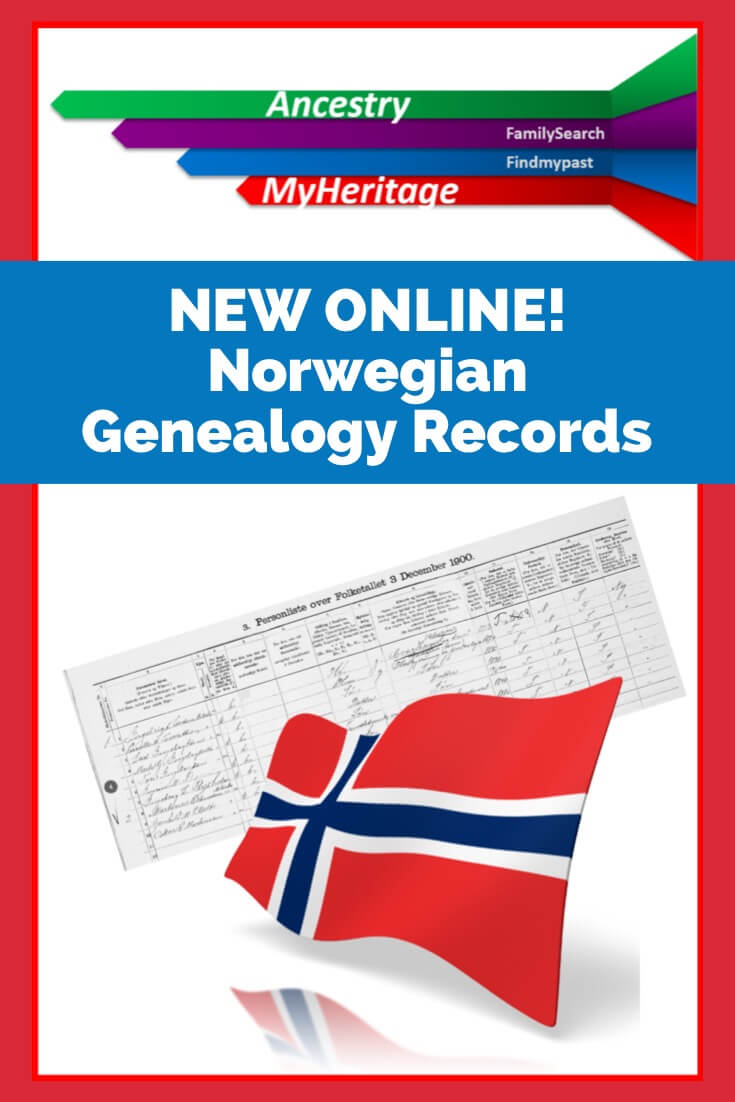
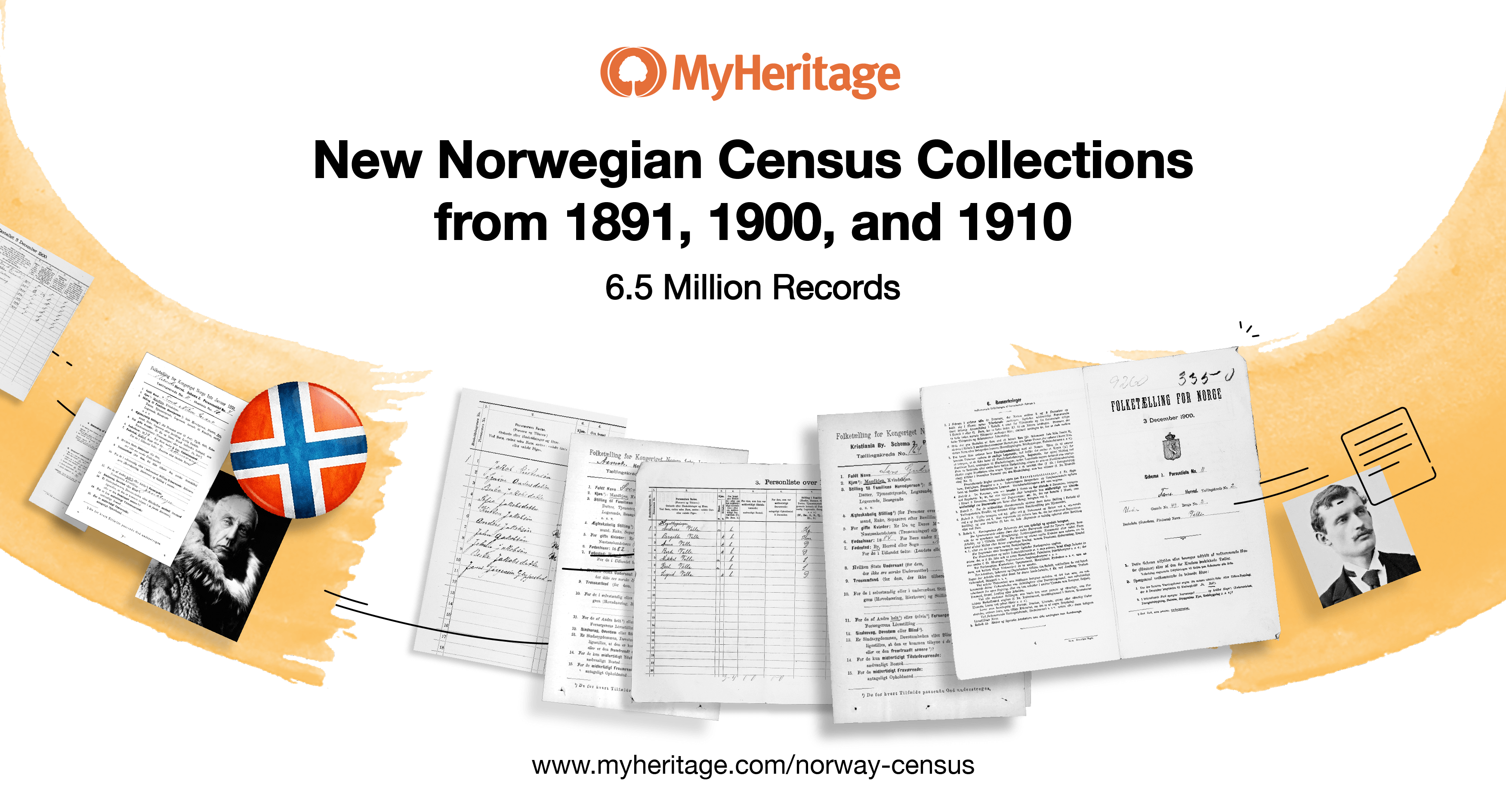
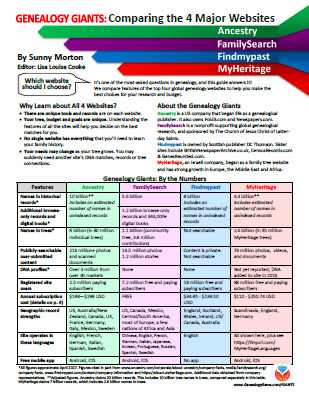

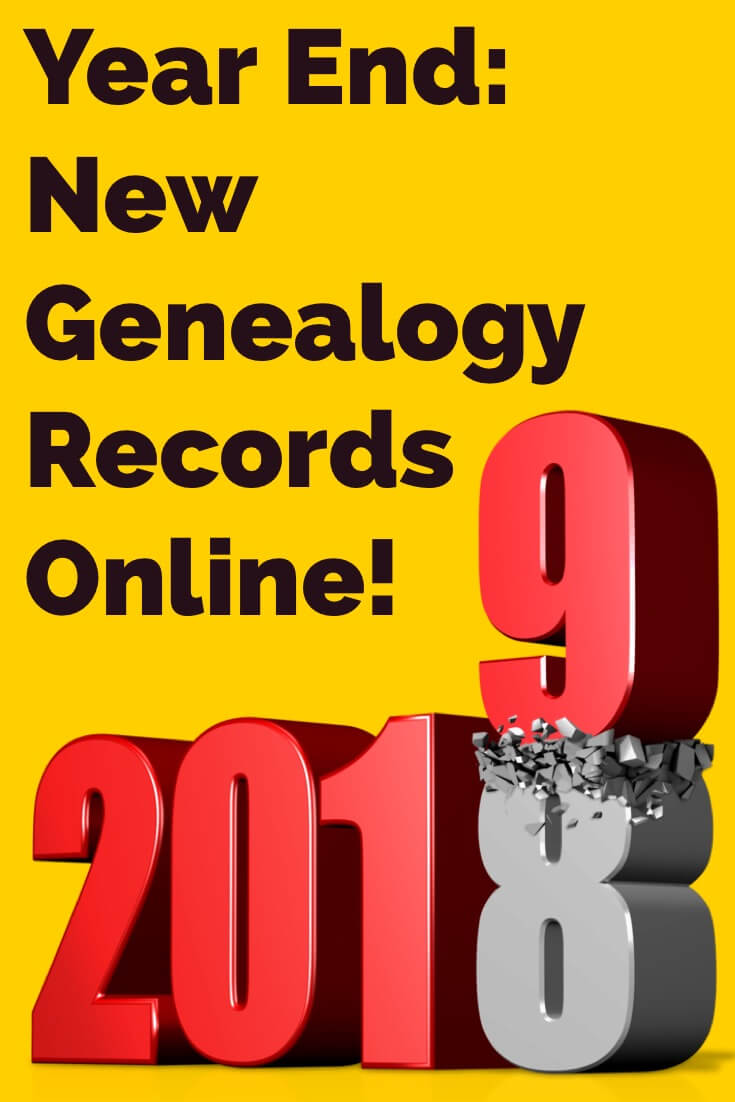

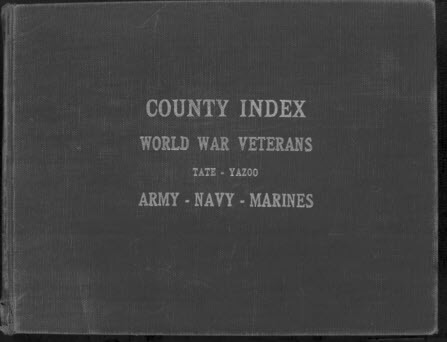 Mississippi, World War I Army Veterans, Master alphabetical index, 1917-1918
Mississippi, World War I Army Veterans, Master alphabetical index, 1917-1918